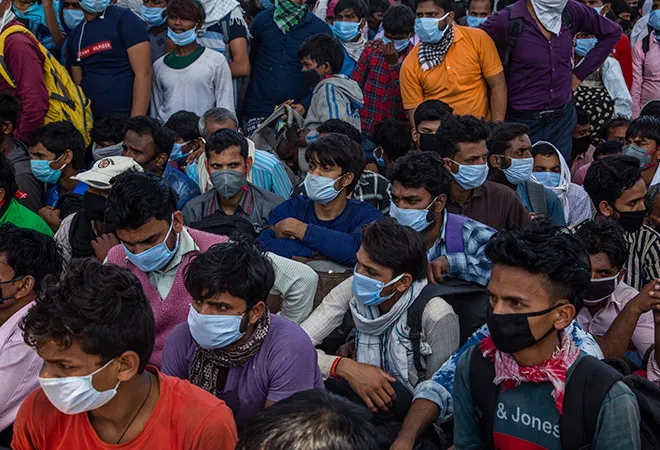As India continues its fight against the spread of COVID-19, new dimensions of policy challenges are gradually emerging at the surface. One such challenge lies in the domain of federal politics. The spread of the contagion in the past few months has already compelled the Centre-State relations to adopt a coordinating and cooperative demeanour despite the obstacles.
As India enters its fifth phase of lockdown, the number of coronavirus positive cases continues to steeply rise in the country. Hence, the imperatives of mutual trust, assistance and constant communication would increasingly become an indispensible asset for the Centre as well as the States to assiduously confront the crisis. The unprecedented policy challenges that the pandemic and the prolonged lockdown has posited requires innovative policy interventions where the Centre in cahoots with the States must act efficiently in order to assuage the bludgeoning human sufferings.
Evolving challenges
In India’s fight against the pandemic, the Centre-States relations have witnessed some frictions regarding vital decisions in its initial period. Political scuffle over key issues like declaration of the nationwide lockdown without the consultation of the States, the irregular supply of essential medical equipment, the plight of the migrant workers and the tackling of the crisis by few opposition ruled States, came to the forefront.
However, subsequent attempts of forging coordination between the Centre and the States as well as amongst the States mitigated the chances of political acrimony and policy ambiguity in the middle of the health crisis. But as the life and the livelihood challenges are getting severe with time, further federal cooperation would be of paramount importance in dealing with the evolving problems regarding two significant aspects during the pandemic.
First, the abysmal nature of information asymmetry regarding the profile, location and status of the millions of migrant workers, which triggered the crisis in the first place, would also hinder the present and future attempts of providing them health and socio-economic security. Second, the rapid spike of the coronavirus positive cases in some States has given rise to sub-national protectionism which might lead to a serious political, administrative and economic crisis between certain States.
Information asymmetry
One of the most pathetic and heart-wrenching outcome of the lockdown due to COVID-19 is the unimaginable sufferings of the millions of internal economic migrants who worked in India’s major urban conglomerates and lost their jobs in this crisis. After facing the tremendous brunt of the situation in the last two months, they are now going back to their native States in the Shramik Express and buses that the government is running for transporting the migrants from the State where they worked to their native place.
However, despite the governmental assurances and policy declarations, the vulnerability of these workers is unlikely to be taken care of due to the ensuing lack of communication and absence of information sharing between the Centre and the migrants sending and receiving States. Such lack of coordination is posing health as well as socio-economic insecurity for these millions of returnee migrants in their native States.
First, as it is being widely reported, the workers are not transported keeping the social distancing norms in mind and they are also facing humongous hardships during the journey as well, increasing their risk of getting infected. On the other hand, the States where the migrants are being sent back are accusing the Centre of not informing the respective government regarding the details of the arriving migrants.
Hence, proper health screening measures are not being able to be taken up for these migrants, risking their health as well as the health of the people of the State. So the States have already started highlighting the flight of the migrant workers for the spike in the COVID-19 cases. Apart from the health crisis, such persistence of fear and paranoia related to the return of the migrant workers, might give rise to social stigma and subsequent social instability further adding to the woes of these innocent hapless populace.
The Centre is planning to redefine the categorisation of “migrant workers” in order to ensure better dissemination of social and health benefits to the hitherto excluded economic migrants who remain at the receiving end in this crisis. Though the initiative is well-meaning, any such attempt would require systematic and elaborate information gathering and sharing between the Centre and the native as well as the host States of these migrants.
Such sharing of information is extremely crucial for ensuring proper food distribution and other welfare services as well as for new work allocation to these migrant workers scattered in various regions of the country who have been rendered jobless and would urgently require state assistance for survival. Tracing the location and identity of the migrant workers who are involved in menial labour is a daunting task because of their high mobility and inadequate documentation. So, ground analysis of their situation would involve high level of administrative collaboration between the Centre and the States in the coming days.
Sub-national protectionism
As the lockdown demanded the closing of the inter-State borders, the crisis has witnessed the rise of the salience of sub-national identities in many states. Such rise of the regional identities might spell an imminent crisis in the inter-State relations in the near future. Such a tussle can propel serious economic and cultural disruptions. Hence, the coordinating role of the Centre in order to avert any such crisis would be extremely crucial at many levels.
As the reports of the sufferings of the stranded migrant workers in many States came to the forefront, the governments of their native States have accused the host States of mistreatment of their people. On the other hand, reports suggest that many migrant workers, especially the ones involved in essential services, are leaving the host States concerned about their healthy security due to the increase in the Covid-19 cases in those States.
Both these developments might give rise to reluctance and antagonism amongst these States and its people which might discourage inter-State mobility of labour in the future. The people who had to face tremendous hardships during the lockdown might not want to return to their workplaces in the host States and might try to find work in their own native State that might trigger a serious labour crisis in the host States. Though some attempts are already being made by some states to stop the flight of workers, but it might prove to be too late and too little.
Moreover, the States which have witnessed the flight of migrant workers involved in essential services in this hour of crisis might see reason to rely more on and recruit more people from their own States in order to shed their dependence on the migrant workers during such crisis. Adding to this, the hardening of States borders in order to restrict the entry of people from the States where the COVID-19 cases are relatively high, might herald a new form of regional stigmatisation which is detrimental to inter-State cooperation.
This might trigger a serious inter-State economic and well as cultural disruption which might impact seamless State to State mobility which has till now been the hallmark of regional integration and national unity in India. In such an evolving challenge of inter-State discordance, the Centre’s role as an efficient mediator will be significant in order to quell the confusion and misunderstanding amongst the States.
Imperative of cooperation
History bears testimony to the fact that Centre-State relations as well as inter-State relations in India have passed through turbulent phases in the past. Hence, cooperation among the Centre and the States has always been instrumental in governing a diverse polity like India. But the pandemic and the prolonged lockdown has given rise to unprecedented policy challenges that warrants systematic and sincere cooperation and coordination both between Centre and the States as well as amongst the States.
The ruling dispensation at the Centre, which has pronounced its commitment towards ‘cooperative federalism’ must be the lynchpin around such a cooperative framework amongst States, can be devised. In this regard, the existing institutional mechanisms like Inter-State Council which has remained largely moribund can be rejuvenated during this crisis. But above all, sincere and immediate repudiation of political hoodwinking and opportunism by all stakeholders will be instrumental is shaping the trajectory of relations between the Centre and the States during this crisis.
This commentary originally appeared in South Asia Weekly.
The views expressed above belong to the author(s). ORF research and analyses now available on Telegram! Click here to access our curated content — blogs, longforms and interviews.




 PREV
PREV


